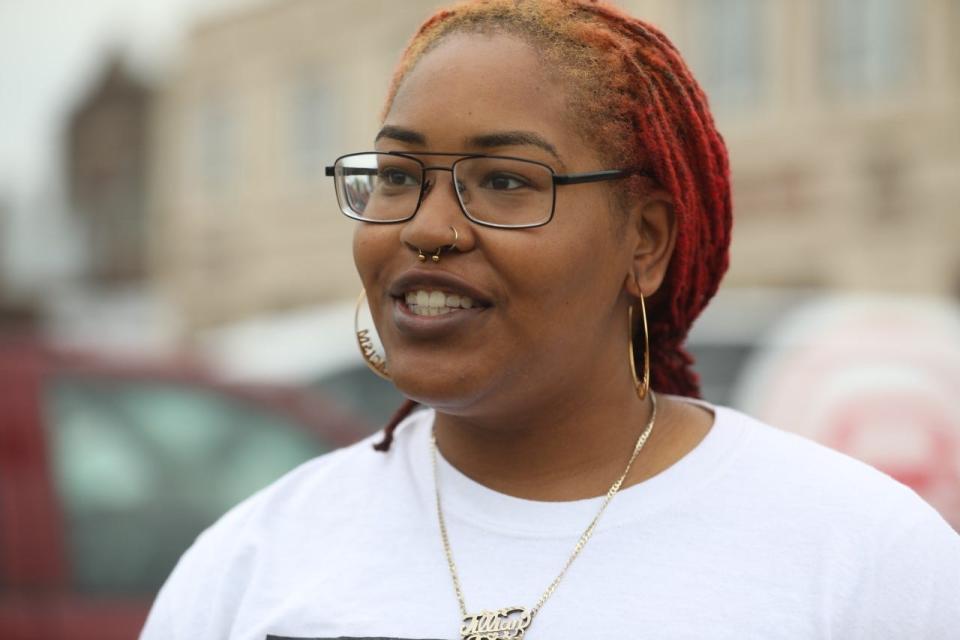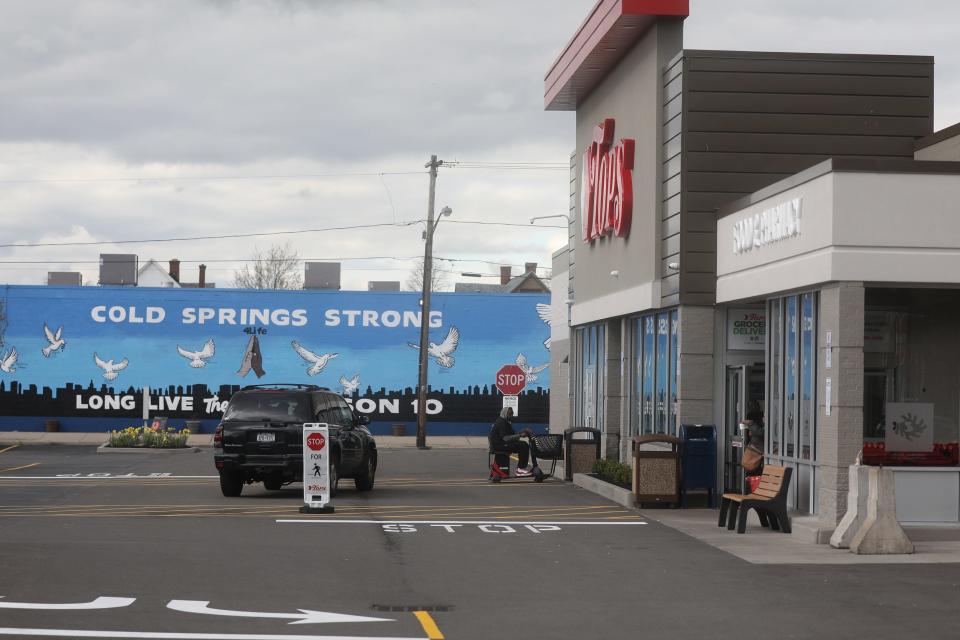'Constantly remembering’ one year after a racist, murderous rampage at a Buffalo supermarket
The words came to Jillian Hanesworth in the wee morning hours after the May 14 massacre last year at the Tops supermarket on Buffalo's East Side.
They were raw, unfiltered and wrenching for her. Buffalo's first poet laureate, Hanesworth had lived and worked in the same neighborhood, had shopped at the same Tops, had known some of those who died in the racist-motivated fusillade of gunfire.
How do you find a place to hold a pain that’s larger than your body?
Not knowing your heart could be bent that way
Be broken into a million shards of glass
How can you handle not knowing that your heart was made of glass?
How do you piece it back together when you never knew what it looked like?
You never got to see the picture on the box
No one saw it coming… the pain
But it came like a thief in the night
How do you reign in the anger?
The violation
The crime scene that will always be a crime scene
The hurt that will never be resolved or restored
She awoke on May 15, teary-eyed, the poem coming to her in painful fragments. She had no choice but to write it. They would be the first words of many in the year since.
Since that horrific day, Hanesworth has become a voice who has helped others navigate the trauma, a poet called upon by everyone from local schools to the Buffalo Bills and Sabres to speak and recite. Now 30, she sometimes finds herself shouldering a responsibility that she acknowledges can be daunting; still, she does not shy from it.
"I feel like I'm constantly remembering that this is real life, that this actually did happen and I'm still coming to terms with the way I looked at the world and the way I looked at trauma," she said in an interview. "It was different on May 13 than it became on May 14.

"Healing doesn’t mean that you get better. It's just constantly readjusting and constantly finding a way to accept what is your new normal. Sometimes it hurts and sometimes it doesn't. Sometimes you cry and sometimes you don’t."
Building a better culture
Her poetry does not sidestep the grief of the day when 10 Black people were murdered because of their race, but Hanesworth also tries to map paths to make headway against that very racism. At schools, she said, she encourages students and teachers to recognize the power structure too long defined by race in this country.
"That's how we build a better culture, where we don't have someone massacring a school or a young adult massacring a grocery store solely because they don't like the way another person looks or because they don't like their race," Hanesworth said.
At some schools , she has taken on almost a rock-star persona, with students of all ages wanting to pen their own poetry after her visits. For instance, fourth-graders at Dunkirk Elementary invited her to their school to bolster a poetry unit they'd started on earlier in the year.
At the session, Hanesworth told "about what poetry means to her, the story of how she started writing, and how she is now using poetry for social change," said fourth grade teacher Kyle Damon. As well as her own poem, she read poetry from students.
"It was an awesome event, and great to have our work showcased by someone like Ms. Hanesworth," Damon said in an email. Within days after the appearance, students were writing her, urging her to come back soon, if not immediately.
Tragedies compounded
For Hanesworth, like the Buffalo region, last year had its tragedies beyond the Tops killings. There were crippling blizzards, with one particularly deadly. There was the New Year's Eve fatal fire in the city that killed five children and their grandmother.
'The pain is real.' Buffalonians push on through fire, ice and grief
Though 70 miles south from Buffalo at the Chautauqua Institution in Chautauqua County, there was the stabbing of novelist Salman Rushdie as he prepared for a lecture. Rushdie, who survived, had been the target of a fatwa, or a death threat, issued by Iran's religious leadership over the author's 1988 novel "The Satanic Verses."
Hanesworth was scheduled to give a lecture at the Chautauqua Institution shortly after Rushdie's. She'd prepared for weeks and bought a new dress, slightly nervous about her appearance at an internationally recognized haven of teachings of arts, sciences, culture and faith. She intended to talk of violence motivated by hate.

"It was so crazy, the irony of that attempted assassination on (Rushdie) based on his belief that we use religion for violence," Hanesworth said. Her talk was canceled; others came and sat with her as she regrouped and worked again through a whirlpool of emotions.
"Some people made space for me just to breathe. ... I remember driving home and being like, 'What is happening and why is violence everywhere for me?'"
Hanesworth said she recognizes the reality that much is as it was last year: The internet still houses the virulent racism on some platforms that motivated Payton Gendron in the days before his murders at the Tops. As well, she said, she sees little that would prevent another Payton Gendron from purchasing a semi-automatic firearm and cladding himself in body armor with murderous intent.
She has yet to go into the Tops since it reopened.
"It's the pain of the day and the memories of the day and it’s the overall understanding that even after all of that the same issues still exist," she said. "Think about it: This man could easily identify where Black people shopped because it was the only store in our community and it still is the only store in our community."
Yet Hanesworth, whose sunny smile can re-emerge even in the darkest of times, continues to be hopeful. She is only one of many young voices now striving to improve the conditions in East Buffalo and other of the city's more impoverished neighborhoods.
Here's how Buffalo's East Side is building its own food economy
"I do feel some hope because one of the things we've seen since May 14 is a new rise of leaders, a new set of ideas, new strategies to be able to get resources directly to our community," she said. "That right there is amazing."
It was because of this hopeful energy that some asked her to write another poem in the aftermath of May 14, a poem that could provide radiance to pierce the darkness.
She did.
Let the hopeful healing waters flow
Ushering in a rebirth of our sense of self
Let the flowing waters remind us of time
Current yet fleeting like life itself
Large yet within reach just as the ancestors
Let the hopeful healing waters flow
Cleansing all pain and fear
All hurt and regret
Let the water heal our people
Reminding us that even our small marks
on this huge world are necessary
Let the hopeful healing waters flow
Let the water tell the stories of those that came before us
Those who fought and believed for us
Those with the strength and power of a high tide
Those with the meekness of a still pond
Let the beauty of the unknown offer comfort and hope
For within water there will always be life
This article originally appeared on USA TODAY NETWORK: Buffalo mass shooting: 2 poems by poet laureate Jillian Hanesworth

